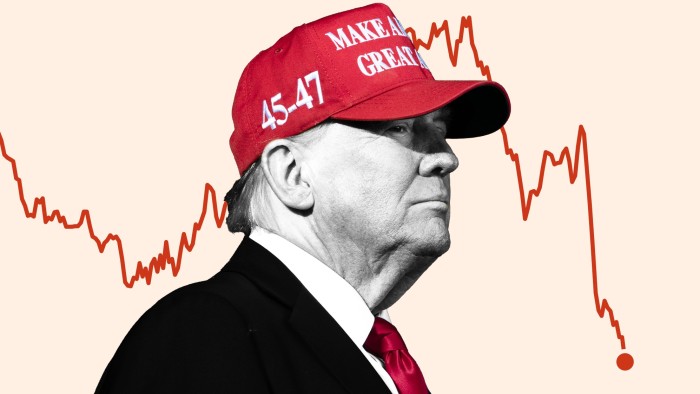Unlock the White House Watch newsletter for free
Your guide to what the 2024 US election means for Washington and the world
Donald Trump’s decisive electoral victory last November was won on the back of a diverse group of voters, united in discontent with rising prices. Just weeks into his new administration, however, this coalition is rapidly unravelling as reality proves rather different to expectations.
Those hoping for prosperity under Trump have had an unpleasant shock. Wednesday’s so-called liberation day was the culmination of a 10-week long bonfire of conservative economic convention in America. The standard fare of growth-seeking deregulation and tax cuts gave way to an act of amateurish economic vandalism that betrays both the “us vs them” ideology at the heart of everything Trump does, and the lack of any clear framework to his actions.
The speed and scale of the American public’s souring on Trump’s economic agenda is stunning. This week, just before the tariff chaos, 63 per cent of Americans had a negative view of the government’s economic policy, comfortably the highest figure since records began almost 50 years ago.
All-time records were also shattered for the share of people who expect the economy to further deteriorate over the next year. Just 25 per cent of US adults said they expect their finances to look better in five years than today — lower even than at the nadir of the Great Recession.
Notably, these sharp deteriorations are being felt across the aisle. Even before “liberation day”, a third of Republicans disapproved of Trump’s actions on the economy, a remarkable feat given levels of partisan polarisation in America. A lot of people who thought they were an “us” have discovered they are a “them”.
To understand how we got here, one has to first acknowledge that Trump is not in any real sense either a conservative or a Republican. No need to take that from me: it’s a well-evidenced characterisation that has been made by multiple prominent figures in the GOP over the years.
Economies abhor uncertainty. Trump feeds off it. Measures of economic policy uncertainty have exploded to all-time highs both in the US and worldwide in recent weeks. Officials and companies alike have been buffeted this way and that by announcements that even those making them seem unable to predict. The administration’s goal seems more about leverage than feeding into a coherent industrial policy.
The economic disconnect between Trump’s Maga on the one hand and the wider conservative Republican party on the other is clear in polling data shared with me by YouGov. This shows that the narrow subset of voters who identify as Maga Republicans continue to approve of the president at astronomically high levels, even after the tangible turmoil of the past 10 weeks.
But the larger group of other voters who backed Trump last November is rapidly souring on his economic policies and overall record. (Interestingly, the same does not yet appear to be true of Trump’s performatively hostile immigration policy, where arrests and deportations have done little to turn off those who backed the president in November.)
Trump, his vice-president JD Vance, Elon Musk and the other senior figures around him operate largely in their own closed media ecosystem, populated by vocal members of the deeply ideological Maga community. As such they tend to be detached from both wider public opinion and dissenting voices.
This may give the president and his team the sense that their actions have been much better received than they have. But the data suggests that while the Maga echo chamber may be impervious, it is far from all-pervasive. According to the University of Michigan’s consumer sentiment survey, the share of Republicans who have encountered critical news stories about Trump and his policies has climbed sharply in recent weeks. Evidently, distracting Americans from the realities of the stock market is a task too far for the podcast bros.
In one telling comment following the Democratic victory in Tuesday’s closely watched Wisconsin Supreme Court race, the local Republican party chair expressed shock at the result, remarking that “Maybe I have blinders on”.
There are two clear lessons from Trump’s second term thus far. The first is that he’s not ushering in a new era of American prosperity. The second is that as more people realise this, the political situation could start to change quite quickly.











